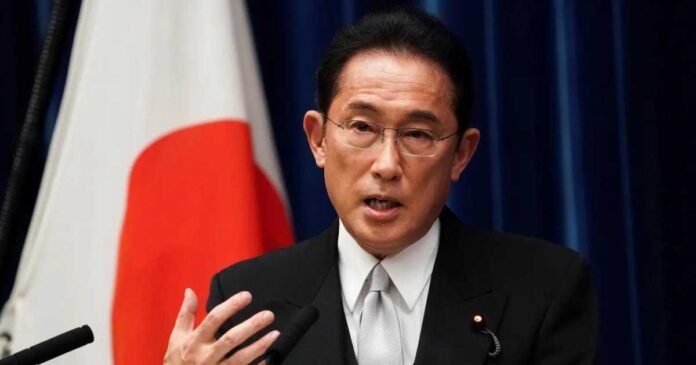Japan’s Prime Minister, Fumio Kishida, has announced that he will not seek re-election as the leader of the ruling Liberal Democratic Party (LDP), stating that the party needs a “new start.” This decision marks a significant turning point in Japan’s political landscape as the LDP prepares to elect a new leader in September, which will also result in Kishida stepping down as Prime Minister.
Kishida, who has served as Prime Minister since 2021, has seen his support diminish due to a series of challenges, including a corruption scandal involving members of his party, increasing living costs, and a weakening yen. His approval ratings plummeted to 15.5% last month, marking the lowest rating for a Japanese Prime Minister in over a decade.
In a press conference held on Wednesday, Kishida emphasized the need for change within the LDP. He stated, “In the upcoming presidential election, it’s necessary to show the people that the Liberal Democratic Party will change.” He further added, “A transparent and open election, and free and open debate are important. The first easy-to-understand step that indicates that the LDP will change is for me to step back.”
This decision comes amid doubts within the LDP about whether Kishida could lead the party to victory in the next general election, scheduled for 2025. Despite the party’s long-standing dominance in Japanese politics, having been in power almost continuously since 1955, Kishida’s departure has shocked many within the party.
A senior LDP leader expressed disappointment at Kishida’s decision, noting that efforts were made to persuade him to run for re-election. However, Kishida reportedly responded that it would have been “irresponsible” to do so. Another member of Kishida’s faction within the party described the decision as “very regrettable and unfortunate,” acknowledging Kishida’s achievements in foreign policy, defense, and domestic politics. However, they also recognized that his decision to step down was influenced by issues related to “politics and money.”
The corruption scandal that has plagued the LDP is a significant factor in Kishida’s decision. Last December, four LDP cabinet ministers resigned within a fortnight due to a fundraising scandal involving the party’s most influential faction. This scandal also led to the resignation of five senior vice-ministers and a parliamentary vice-minister from the same faction, which was previously led by the late Prime Minister Shinzo Abe.
The scandal drew public criticism, particularly towards Kishida’s handling of the situation, which contributed to his declining popularity. At the same time, Japanese households were grappling with soaring food prices, the highest increase in almost half a century. The combination of economic challenges and political scandal eroded public trust in the ruling party, despite a fragmented and weak opposition.
Political analysts have described Japan’s current situation as a “once-in-a-generation” political crisis, with the ruling party struggling to restore its image. The upcoming LDP leadership election is expected to be a critical moment for the party as it seeks to regain public confidence and prepare for the general election in 2025.
Fumio Kishida’s decision to step down comes after a long and distinguished career in Japanese politics. Coming from a family of politicians, with both his father and grandfather serving as members of Japan’s House of Representatives, Kishida first entered the House in 1993. He later became Japan’s longest-serving foreign minister, holding the position from 2012 to 2017.
Kishida assumed the role of Prime Minister in October 2021, following the resignation of Yoshihide Suga, who stepped down after just one year in office. Under Kishida’s leadership, the LDP secured a victory in the 2021 general election. Over the past three years, his government has focused on policies aimed at raising wages and household incomes amid a cost-of-living crisis.
During his tenure, Kishida oversaw Japan’s reopening after the Covid-19 pandemic and navigated the country through one of its most shocking political events—the assassination of former Prime Minister Shinzo Abe in July 2022. Kishida also made the controversial decision to honor Abe with a state funeral, a move that drew both support and criticism.
On the international stage, Kishida has been recognized for his diplomatic efforts. Japan, a key ally of the United States in the Indo-Pacific region, faces challenges from an assertive China and a nuclear-armed North Korea. Under Kishida’s leadership, Japan expanded its military budget and took cautious steps away from its post-war pacifist stance.
Defense cooperation with the United States deepened during Kishida’s tenure, and he also worked to mend relations with South Korea, hosting President Yoon Suk Yeol in Tokyo on a historic visit. In another unprecedented move, Japan, the United States, and South Korea issued a joint statement at a Camp David summit last August, calling for expanded cooperation among the three nations.
As the LDP prepares for its upcoming leadership election, the future of Japan’s political landscape remains uncertain. Kishida’s decision to step aside signals a moment of reflection and potential transformation for the ruling party, which must now navigate a path forward amid ongoing economic and political challenges.
